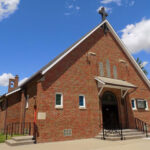
Father William Kneemiller talks with preschool students at St. Paul the Apostle Catholic School in Davenport about the Pslams.
By Father Bill Kneemiller
For The Catholic Messenger
It is mid-October and I am on a pilgrimage with a group from Kansas City, Kansas, led by their Archbishop Joseph Naumann. We are spending the first three days in Jerusalem’s Old City and are close enough to walk up to the Temple Mount area. Memories of my study program here during my seminary days in the late 1990s are still fresh. I lived near the Temple Mount for six weeks. As our group walks into the Old City, we pray Psalm 122:
“I rejoiced when I heard them say: ‘Let us go up to God’s house.’ And now our feet are standing within your gates, O Jerusalem.”
One of our blessings here, among many, is staying at the Notre Dame facility just across from the New Gate. We have a 20-minute walk to the Temple Mount and the Holy Sepulchre. At the Temple Mount Psalm 27 comes alive:
“There is one thing I ask of the Lord, for this I long, to live in the house of the Lord …, to savor the sweetness of the Lord, to behold his temple.”
Here on the Temple Mount, the actual site of the ancient Jewish Temple, our guide, Morat, a Palestinian Christian, leads us to a quiet area behind the Dome on the Rock, the mosque built on the Temple site. The mosque was built about 600 years after the Roman Army destroyed the Temple in the year 70 AD. Our guide mentions how seriously the Orthodox Jews observe the Sabbath and go to great lengths to avoid work on that day. My first reaction is to recall Jesus’ critique of the Pharisees who missed the core meaning of the Sabbath when they criticized Jesus for healing on the Sabbath.
However, Morat drops a theological bombshell. He mentions that the Jews take the Sabbath so seriously because the purpose of the Sabbath is to enter into the likeness of heaven! As we pray on this site, I recall that for the Jewish people the Sabbath observance is much more than a day to rest from work. It is a time to enter into a dynamic interior spirituality as they gather to hear God’s word and to have their hearts formed by prayer and Scripture.
In Jesus’ time and earlier, priests in the Temple offered an animal sacrifice at the ninth hour, 3 p.m., which is our church’s hour of mercy. After 70 AD, however, all sacrifices ended. The early Christian communities continued to celebrate Jesus as the New Temple as they prayed God’s word and offered the new sacrifice of the Eucharist. Two-thousand years later, could we as Christians enter into our Sabbath and experience the likeness of heaven? Yes, because we also have the real presence of Jesus Christ in the holy Eucharist. Jesus is heaven.
Psalm 48 addresses this longing: “The Lord is great and worthy to be praised in the city of our God. His holy mountain rises in beauty, the joy of the earth. Mount Zion, true pole of the earth, the great King’s city! … O God, we ponder your love within your temple.”
My hope is that we can recover a reverence for our Christian Sabbath and use this wonderful day to “Enter into Heaven!” Two practical suggestions to help us pray the psalms that connect us with the ancient Temple and with Jesus as the “New Temple:”
• Read the “Shorter Christian Prayer” book. I offer complimentary copies for couples and families to promote family prayer. I also offer full-color booklets on a five-minute version of Morning Prayer for grades K-12.
• For preschoolers, my “St. Joseph” helpers have made an array of Psalm 117 Prayer Projects to help preschoolers learn Psalm 117 by heart.
(Contact Father Bill Kneemiller, chaplain of the Kahl Home in Davenport, at kneemillerw@ diodav.org.)











